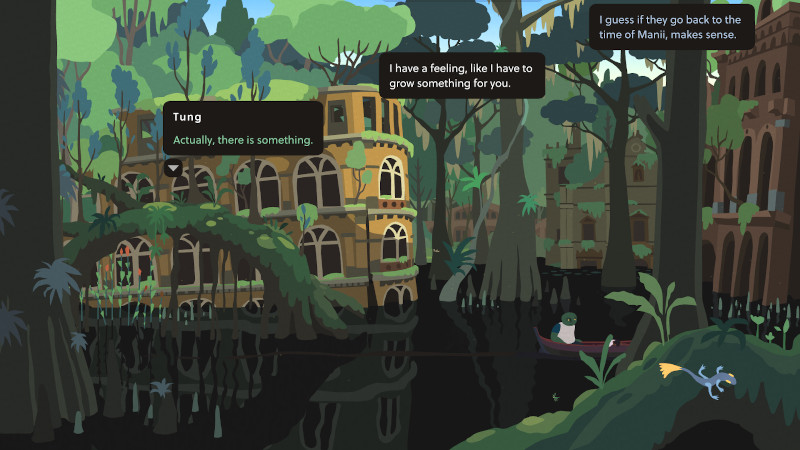Mutazione
-
www.wikidata.org/wiki/Q67988931
Online stores itch.io Steam - 2019 video game
-
mutazione-1604269925527.jpg
The world of Mutazione is a joy to explore, even if the overall experience is "on rails".Credit: Die Gute Fabrik. Fair use.Source: own screenshotSource data licensing:
Data from Wikidata is available under Creative Commons CC-0.
lib.reviews is only a small part of a larger free culture movement. We are deeply grateful to all who contribute to this movement.Reviews
Please sign in or register to add your own review.
Mutants like usWhat’s in a game? Is it that you have to click the right button at the exact right moment? Or that it transports you to another world? Mutazione is firmly in the latter category—a narrative adventure with no action sequences and barely a puzzle in sight, but with a world that comes alive with ambience and the characters that inhabit it.

The world of Mutazione is a joy to explore, even if the overall experience is very linear. (Credit: Die Gute Fabrik. Fair use.)Mutazione is also the name of the island where most of the game takes place. It’s a place implausibly forgotten by the rest of civilization; an island whose flaura and fauna (including its human inhabitants) have been transformed by a meteor impact many years ago. You play as Kai, a teenage girl who visits her sick grandfather on the island, and in the process becomes immersed in its past, present, and future.
Much of the gameplay consists of Kai walking from place to place (or person to person), occasionally performing simple fetch quests to advance the plot. Dialog (which isn’t voiced) gives you limited choices, such as the option to crack a joke in response to someone else’s remark, or to remain silent.
Gardening With Feeling
Each game day is broken into segments, and you decide when to advance from morning to noon, from afternoon to evening. As the game time advances, so do the game’s little subplots, including a fair bit of soap opera about love relationships that are burgeoning or that seem to be falling apart.
It soon becomes clear, with her grandfather’s help, that Kai has a gift for gardening in Mutazione’s unusual ecology, where music, emotion, and plant growth seem to be inextricably connected. Throughout the game, you will collect seeds and cultivate gardens situated in different microclimates. If you fear or hope that there’s a challenging mini-sim hidden inside the game, it’s not so: the gardening parts of the game are meditative and creative, not difficult.
A “garden mode” is unlocked after you complete the story, which lets you experiment to your heart’s content. Or so I’m told—in the Linux version, the mode never appeared for me after I finished the game.
The Verdict
Mutazione is undeniably gorgeous. The art direction is simply stellar, from beautifully drawn abandoned buildings, to chickens scattering as you approach them, to spear-wielding, sentient dots refusing to let you enter their habitat. The soundtrack is great, too, and when the island band performs a song in the local bar, you can imagine that you’re right there with the mutants.
The plot is largely coherent, but much of the game is about making emotional connections. The characters of Mutazione have their own fears and ambitions; they don’t exist to help the player reach some goal, but they do make Kai feel welcome in this world that is as new to her as it is to us.
I would give the game 4.5 stars, rounded up. If you enjoyed Oxfenfree but found its spooky story a little bit stressful, you’re likely to love Mutazione. The only thing I missed is a sense that I had control over where the story was headed, or at least a final game-defining choice. Narrative designer and writer Hannah Nicklin has described the game as having “multiple middles” instead of multiple endings, and that’s true—there’s enough to uncover, at least, to justify a second playthrough. In any event, the first playthrough is well worth the price of admission.
